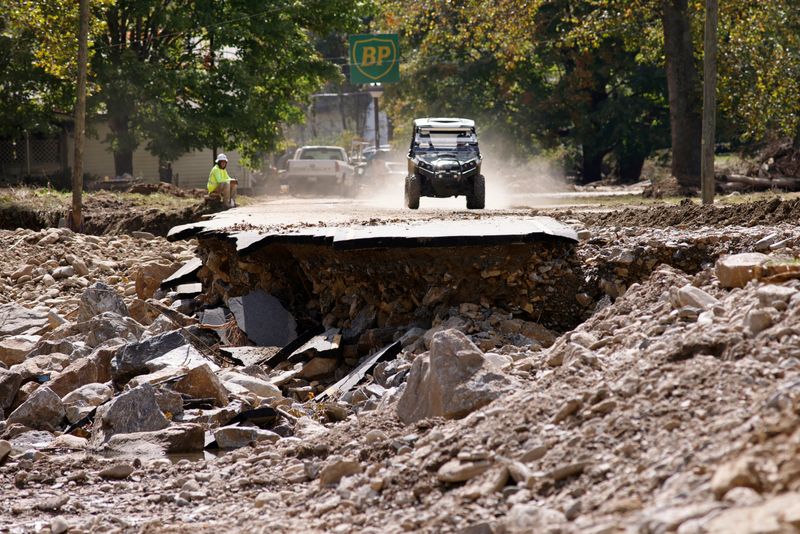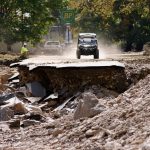(Reuters) – North Carolina lawmakers passed legislation on Wednesday that will make it easier for residents affected by Hurricane Helene to vote, as Donald Trump’s allies increasingly fret that fallout from the devastating storm will depress turnout in the battleground state’s conservative mountain regions.
More than 100 people died in western North Carolina after Helene smashed the region last month, sparking massive flooding and mudslides that destroyed much of the area’s infrastructure and left some towns completely cut off.
While both Trump, the Republican presidential candidate, and Vice President Kamala Harris, the Democratic standard-bearer, have said they are focused on recovery efforts, the storm has obvious political implications heading into the Nov. 5 election.
North Carolina is one of seven competitive swing states that both Harris and Trump have a shot at winning, and their campaigns are fighting tooth and nail for every vote.
The area hit hardest by Helene is deeply Republican. Trump won about 62% of the vote in 2020 in the 25 counties declared to be a disaster area after Helene, while Democratic President Joe Biden won about 51% in the remainder of the state, according to a Reuters analysis.
In a sign of the stakes for Trump, his campaign released a list of 10 measures on Tuesday night that it supports to make voting easier in the affected part of North Carolina. Among those measures is allowing voters displaced by the storm to vote in a different county on Election Day.
In a statement, Trump co-campaign managers Susie Wiles and Chris LaCivita said the improvements in voting access “will ensure the people who have already suffered from the storm don’t lose their right to participate in this important election.”
Many of those recommendations appeared to make it into the legislation, which was approved unanimously on Wednesday by North Carolina lawmakers as part of a broad emergency relief package.
The legislative package allows local election boards in the 25 storm-hit counties to modify voting hours, combine precincts, change voting sites and permit absentee ballots to be returned to any county board or voting site, among other measures.
Katelin Kaiser, policy director for Democracy NC, an advocacy organization that works on voting access issues, said she supported the measures.
But she questioned why legislators were not modifying the rules in all parts of the state, particularly given that North Carolinians elsewhere are now involved in recovery efforts in the mountains.
She also noted that the efforts to ease voting access come after the Republican-led legislature pushed through a pair of bills last year that tightened voting restrictions.
“Many times our General Assembly and lawmakers have said, ‘Voting is easy,'” Kaiser said.
“But we know that life happens and to be now reacting rather than be in a place where we have robust pro-voters laws … these are things that are all preventable.”
INTENSIFYING CONCERNS
As Helene’s destruction has become more apparent, concerns about voter turnout have intensified.
A state election official said 10 early voting sites have had either significant damage or accessibility issues. Nearly 80,000 customers in North Carolina remain without power, according to poweroutage.us, an outage-tracking site.
“A lot of places aren’t getting mail yet,” said Doug Heye, a Republican strategist from North Carolina. “If they lost a mail-in ballot, how do they get another one, and where is that on your list of priorities?”
Asheville, the region’s biggest city and its only significant pocket of Democratic voters, was devastated, with dozens killed in the metropolitan area.
“We are working closely with our legal and voter protection teams and the N.C. Democratic Party to ensure that every eligible voter is able to safely make their voices heard in this election,” said Dory MacMillan, a communications official for the Harris campaign.
But analysts and operatives believe voters in the region’s rural Republican counties will face the most difficulties getting to the polls.
A source close to the Trump campaign said the campaign has held several calls to discuss the situation in western North Carolina.
Michael Whatley, the former chair of the North Carolina Republican Party and current chair of the Republican National Committee, has privately expressed worry about turnout in the western part of the state, according to two people with knowledge of his comments.
The Trump campaign and RNC did not directly address Whatley’s private concerns in a comment to Reuters. The former president has spread false rumors in the aftermath of the hurricane, including implying that emergency officials were slow-walking recovery efforts in Republican areas.
Chip Felkel, a Republican strategist just over the border in western South Carolina, said Trump stood to lose 10,000 to 20,000 net votes, based on his conversations with campaign operatives active in the region.
“In a very tight race, that could definitely play a role in the outcome,” he said.

The former president holds a 0.9 percentage-point lead in the state, according to an average maintained by FiveThirtyEight, a polling and analysis website. That figure is within all major surveys’ margins of error.
At a recent private fundraiser in South Carolina, Lara Trump, the RNC’s co-chair, encouraged donors to donate to the recovery efforts, according to one person in attendance. The better the infrastructure in the area, she said, the easier it will be for residents to get to the polls.
To read the full article, Click Here

